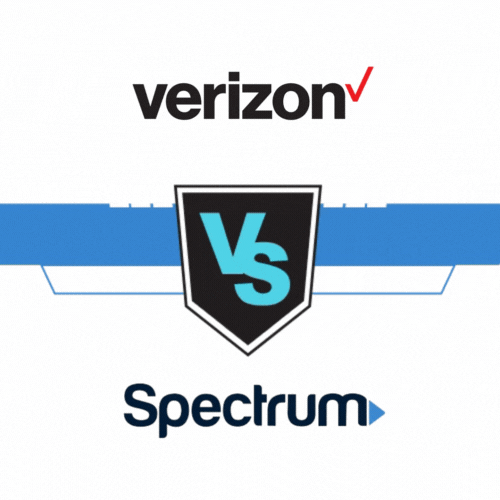Spectrum vs AT&T Internet Plans: Choosing the Right ISP for Your Needs

Selecting the ideal internet service provider (ISP) is much like choosing the perfect pair of shoes – it needs to be a good fit. Two leading contenders in the market, Spectrum and AT&T, offer a range of internet plans designed to meet varied needs and budgets. The key is determining which one aligns best with your online needs. Spectrum Internet Plans: Prioritizing Speed Spectrum offers three core internet plans: Spectrum Internet® 300 Mbps, Spectrum Internet Ultra, and Spectrum Internet Gig, with speeds ranging from 300 Mbps to a remarkable 1 Gbps. These plans are typically presented with a 12-month contract and require Auto Pay. Spectrum also offers a free trial of its Spectrum Internet® 300 Mbps plan with Advanced WiFi for a year. However, potential users should be mindful of additional fees and taxes. Discover the differences between Spectrum and AT&T internet plans to find the perfect fit for your online needs. Compare speeds, pricing, and availability to make an informed decision. Explore Spectrum Internet® 300 Mbps, Spectrum Internet Ultra, Spectrum Internet Gig, and AT&T’s Fiber All-Fi (Wi-Fi) options. AT&T Internet Plans: Emphasizing Fiber-Optic Technology AT&T focuses on Fiber All-Fi (Wi-Fi) internet plans, which leverage the speed and reliability of fiber-optic technology. However, it’s important to note that this cutting-edge service isn’t available in all areas, so eligibility must be checked beforehand. Quick Comparison Spectrum vs AT&T Internet Plans Here’s a brief comparison of Spectrum and AT&T internet plans: Feature Spectrum AT&T Plan options Spectrum Internet® 300 Mbps, Spectrum Internet Ultra, Spectrum Internet Gig Fiber All-Fi (Wi-Fi) Speeds Up to 1 Gbps Not specified Contract 12-month contract with Auto Pay Not specified Free trial Spectrum Internet® 300 Mbps with Advanced WiFi for 12 months Not available Additional fees Yes Not specified Choosing the Right ISP-Spectrum vs AT&T Internet Plans Selecting the optimal ISP requires considering several key factors: Spectrum: Catering to Speed Enthusiasts Spectrum offers three speed-focused plans that cater to varying needs, from casual browsing to serious gaming and streaming. The Spectrum Internet® 300 Mbps plan is particularly popular due to its balance of speed and affordability. AT&T: Leading in Fiber-Optic Internet AT&T provides fiber-optic internet plans, ideal for those who value speed and reliability. However, these plans might not be available everywhere, so it’s important to check local availability. Key Factors to Consider – Spectrum vs AT&T Internet Plans Choosing between Spectrum and AT&T involves weighing several factors: Conclusion: Finding Your Ideal ISP Both Spectrum and AT&T offer a range of internet plans to suit various needs. The right choice depends on individual requirements and budget considerations. Reflecting on the key factors discussed will help in making an informed decision. Disclaimer The information provided here is based on available details from the Spectrum and AT&T websites. For the most accurate and up-to-date information, it’s advisable to contact the providers directly.
Starlink vs Spectrum, Is Starlink’s internet as good as Spectrum’s?

Starlink, a leading satellite internet provider, is particularly suitable for rural regions or people who are frequently on the move. Despite its higher cost, its rapid speeds and unlimited data make it an appealing choice for remote areas where traditional internet options are limited. Satellite internet, like Starlink, operates by utilizing a network of satellites orbiting the Earth to transmit data to and from the user’s dish. These satellites act as relays, allowing users to connect to the internet even in areas where laying cables or installing infrastructure is impractical or cost-prohibitive. However, satellite internet can be susceptible to latency issues due to the long distances data must travel between the user, the satellite, and the ground station. On the other hand, Spectrum, a cable internet provider, often offers more competitive pricing, faster speeds, and greater reliability. If Spectrum is available in your area, it’s generally the preferred option. Cable internet operates by transmitting data through coaxial cables that are already installed in many areas. This infrastructure allows for faster and more stable connections compared to satellite internet, as the data travels shorter distances and is not subject to the same latency issues. However, cable internet availability may be limited to more densely populated areas where the infrastructure has been laid. Let’s delve deeper into the comparison: Starlink offers a range of plans tailored to different needs: Spectrum’s offerings include: Let’s weigh the pros and cons: Starlink’s advantages include its wide availability, portability, fast speeds, and unlimited data. Its satellite-based infrastructure allows it to reach remote areas where traditional internet options may not be feasible. However, its drawbacks include higher pricing and potential waitlists for installation. In contrast, Spectrum boasts wide availability, fast speeds, and unlimited data, making it a reliable choice for users in both urban and rural areas. However, it can be slightly more expensive than Starlink, and there may be gaps in coverage in some rural regions. When it comes to performance, Spectrum generally offers faster and more reliable speeds compared to Starlink. Both providers offer unlimited data, ensuring customers can use the internet without worrying about data caps. In terms of pricing, Spectrum tends to be more affordable, especially when considering the upfront costs associated with Starlink’s equipment. However, Spectrum’s pricing may vary depending on the region and available promotions. Both Starlink and Spectrum provide the necessary equipment to get started, with Spectrum offering additional services such as TV packages, which may be beneficial for some users. However, Spectrum’s TV service may require additional equipment and subscription fees. Ultimately, the choice between Starlink and Spectrum depends on your specific needs, budget, and availability in your area. If you prioritize affordability and reliability, Spectrum may be the better option. However, if you reside in a remote location or require internet access while traveling, Starlink’s offerings may be more suitable. It’s essential to carefully evaluate your options and choose the provider that best meets your requirements.
Discover Spectrum’s Reach: Check Spectrum’s Coverage Map and Availability

Explore Spectrum’s Extensive Coverage: Navigate Spectrum’s Coverage Map and Availability Seeking Spectrum’s availability in your vicinity? Look no further than Spectrum’s Availability Map. Covering predominantly urban and suburban areas, Spectrum spans across 42 states, catering to a whopping 110.6 million individuals. Following its merger with Time Warner Cable and Bright House Network in 2016, Spectrum ascended to become the nation’s second-largest Internet provider. Unveiling Spectrum’s Internet Services Spectrum distinguishes itself with its transparent tiered pricing system, a rarity among cable providers. Presenting uniform pricing for comparable plan speeds nationwide, Spectrum’s plans boast contract-free flexibility, unlimited data, and a waived equipment rental fee. Additionally, cord-cutters favor Spectrum Internet® plans for their streaming-friendly features. Ranked third among the best Internet providers for streaming, Spectrum strikes a balance between affordability and performance. Overview of Spectrum Internet Plans Plan Name Download Speeds Starting Price Data Cap Spectrum Internet Up to 1 Gbps (wireless speeds may vary) $49.99 per month for 12 months with Auto Pay Unlimited Data Commencing at $49.99 per month for 12 months with Auto Pay, Spectrum offers three Internet plans, each featuring varying download speeds. Bundled packages encompassing Internet, TV, home phone, and mobile phone options are also available, ensuring a suitable deal for every Spectrum customer. Discover Spectrum’s Coverage in Your Area Discover Spectrum’s availability in your region with Spectrum’s Availability Map. Explore coverage in urban and suburban areas across 42 states, serving over 110.6 million people. Spectrum Internet Speeds Operating on an HFC (Hybrid Fiber-Coaxial) network, Spectrum delivers wired broadband services. By amalgamating fiber lines for the majority of the journey with coaxial cable lines for local connections, Spectrum offers download speeds ranging from 300 Mbps to 1 Gbps (wireless speeds may vary), with upload speeds reaching up to 35 Mbps (wireless speeds may vary). Bandwidth sharing, typical in cable networks, can result in speed fluctuations during peak hours due to high streaming demand. Cities and Towns With Spectrum Coverage Spectrum’s expansive network spans major cities and towns, including: (*Accuracy not guaranteed. For precise availability, use the zip search and consult Spectrum directly.) Frequently Asked Questions about Spectrum Curious about Spectrum’s reach and offerings? Dive into the world of Spectrum today!
Verizon 5G Home Internet vs Spectrum Fiber Optic Internet: Exploring the Speed Difference and Equipment

A Comprehensive Analysis of Internet Choices In today’s digital era, access to high-speed internet is indispensable for various facets of modern life, spanning from streaming movies and online gaming to remote work and virtual meetings. Two prominent players in the high-speed internet domain are Verizon 5G Home Internet and Spectrum Fiber Optic Internet. While both offer commendable speeds and reliable connectivity, they diverge in certain aspects, including technology, equipment, and availability. Let’s delve into each option to grasp their distinct features and advantages. Verizon 5G Home Internet: Unrivaled Speed and Innovation Speed Benchmark: Verizon 5G Home Internet epitomizes speed and innovation, leveraging 5G technology to deliver unmatched connectivity. With speeds soaring up to 1 Gbps (or 1000 Mbps), Verizon’s 5G service sets the gold standard for high-speed internet, enabling users to stream, download, and browse with lightning-fast efficiency. Imagine downloading an entire high-definition movie in seconds or seamlessly participating in a video conference without any lag or buffering interruptions. Equipment Requirements: Accessing Verizon 5G Home Internet necessitates a specialized router tailored to harness the full potential of 5G technology. Verizon provides this state-of-the-art equipment as part of its service package, ensuring customers are equipped for a smooth and hassle-free setup. For instance, envision a suburban family upgrading to Verizon 5G Home Internet and receiving a cutting-edge router that significantly enhances their online experience. Availability and Expansion: While Verizon 5G Home Internet may not yet be available in all areas, the company actively expands its coverage footprint to bring high-speed 5G service to more communities nationwide. Through ongoing investments in infrastructure and network expansion endeavors, Verizon endeavors to bridge the digital gap, providing reliable, high-speed internet access to households and businesses across the country. Envision a scenario where a rural town gains access to Verizon’s 5G service for the first time, revolutionizing residents’ online connections and communications. Spectrum Fiber Optic Internet: Dependable Connectivity and Steady Speeds Speed Consistency: Spectrum Fiber Optic Internet emerges as another formidable contender in the high-speed internet arena, delivering dependable connectivity and consistent speeds. While it may not match the blazing velocities of Verizon’s 5G service, Spectrum Fiber Optic Internet offers impressive speeds of up to 940 Mbps. This ensures smooth and uninterrupted online experiences, even during peak usage hours when multiple devices are concurrently in use. For instance, envision a household with numerous family members streaming movies, gaming online, and engaging in video conferencing without encountering any slowdowns or interruptions. Equipment Prerequisites: Subscribers to Spectrum Fiber Optic Internet receive a top-of-the-line modem and router explicitly designed to capitalize on fiber optic technology’s benefits. These advanced devices are optimized to deliver consistent and reliable internet connectivity, enabling users to enjoy seamless browsing, streaming, and gaming experiences without disruptions. Spectrum also provides professional installation services to ensure optimal setup and performance. Ponder a scenario where a small business upgrades to Spectrum Fiber Optic Internet and receives expert installation services to maximize their internet connection’s efficiency. Availability and Expansion: Spectrum continues to expand its fiber optic internet infrastructure, gradually extending coverage to new areas and communities. Through ongoing network enhancements and expansion initiatives, Spectrum aims to provide more households and businesses with access to its high-speed fiber optic internet service, enhancing connectivity and digital access nationwide. Envision a scenario where a suburban neighborhood gains access to Spectrum’s fiber optic service, empowering residents with reliable and high-speed internet for all their digital requirements. Deciphering Speed Variance and Equipment Between Verizon 5G Home Internet and Spectrum Fiber Optic Internet. Gain insights into their speeds, equipment necessities, availability, and make an informed decision for your high-speed internet needs. Speed Comparison: Deciphering the Differences The primary distinction between Verizon 5G Home Internet and Spectrum Fiber Optic Internet lies in speed. While Verizon’s 5G service offers unparalleled speeds of up to 1 Gbps, Spectrum Fiber Optic Internet delivers impressive speeds of up to 940 Mbps. While Verizon’s 5G technology showcases cutting-edge innovation and potential for even faster speeds in the future, Spectrum’s fiber optic service offers reliable and consistent performance for households and businesses alike. Making an Informed Decision In conclusion, both Verizon 5G Home Internet and Spectrum Fiber Optic Internet provide high-speed connectivity and reliability, catering to diverse consumer needs. If prioritizing blazing-fast speeds and cutting-edge technology, Verizon’s 5G service may be the preferred choice. However, if valuing consistent and dependable internet performance, Spectrum’s fiber optic service presents a compelling option. Ultimately, the selection between the two depends on individual preferences, coverage availability, and specific internet requirements. FAQs about Verizon 5G Home Internet vs Spectrum Fiber Optic Internet
